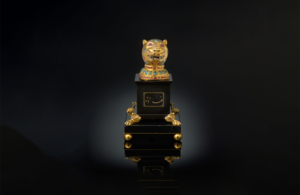Nayantara Lamba, BA History and World Philosophy
On 12 November, the Department of Digital, Culture, Media and Sport (DCMS) imposed a temporary ban on the export of a jewelled tiger head valued at £1.5 million which once adorned the throne of Tipu Sultan. Tipu Sultan was an Indian ruler of a kingdom in Mysore and was a staunch rival of the British East India Company.
After his defeat in 1799, the East India Company looted his kingdom, and the ruler’s throne was broken into various pieces. This included the separation of the eight tiger head finials that adorned the balustrade of the throne.
The decision for the export ban is based on the advice of the Reviewing Committee on the Export of Works of Art and Objects of Cultural Interest (RCEWA). Christopher Rowell, a member of the Reviewing Committee, stated: ‘this tiger’s head, one of four throne finials to survive, including a head in the Clive Museum at Powis Castle (NT), should remain in the country together with the other fragments of the throne, and I hope that every effort will be made to achieve this.’
The RCEWA has made their recommendation on the basis that the finial is an essential part of British imperial history. According to a DCMS press release published on 12 November, the Committee believes the finial’s departure from Britain ‘would be a misfortune because it is so closely connected with our history and national life and is of outstanding significance for the study of royal propaganda and 18th-century Anglo-Indian history.’
The temporary ban has deferred the export license application until 11 February 2022. A further extension until 11 June 2022 may be permitted if there is a ‘serious’ intention to raise funds to purchase the finial at the valued price of £1.5 million. If there is not, the license may go through, and a foreign party will be allowed to purchase the filial.
However, the temporary ban has come under heavy scrutiny, primarily from historians. Many believe this finial to have been looted and question Britain’s claim to it in the first place. According to DCMS, this is not the first time a temporary export ban has been placed on a tiger head finial from Tipu Sultan’s throne. On 16 June 2010, Culture Minister Ed Vaizey placed a similar temporary export ban, to allow money to be raised within the UK, before it be sold to a foreign entity.
“Export bans are overwhelmingly nationalist and greedy, but to apply to an object that was taken forcibly through colonial violence because it’s [important to] ‘our history’ is another level of cognitive dissonance.”
Alice Procter, an art historian and museum enthusiast, tweeted about the use of temporary bans such as this one on 15 November: ‘Export bans are overwhelmingly nationalist and greedy, but to apply to an object that was taken forcibly through colonial violence because it’s importantly “our history” is another level of cognitive dissonance.’
Many have shared Procter’s sentiment, citing the irony of the Reviewing Committee’s statement that this artefact is so ‘closely’ connected to British history, arguing that it is in fact closer to Indian history.
Photo Caption: Tiger Head finial from Tipu Sultan’s throne, valued at £1.5 million (Photo Credit: Clive Museum at Powis Castle).
